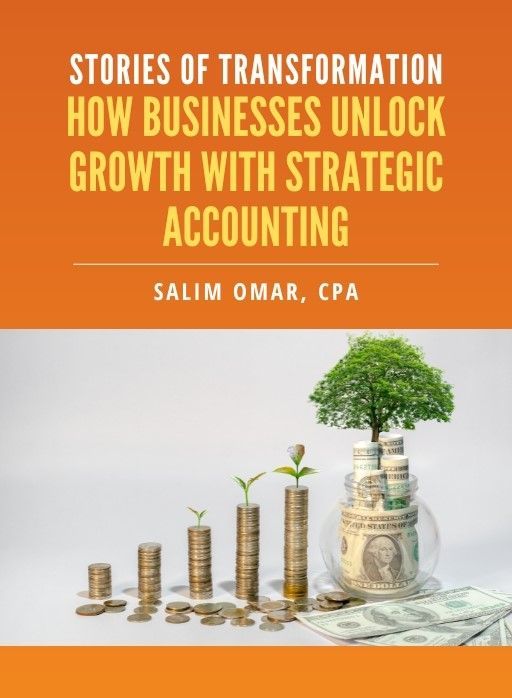Tax-Smart Moves for Investing in Your Future as a Business Owner
When you run a business, every financial move has a ripple effect. Whether it’s upgrading your equipment, rewarding your team, or setting up your retirement plan, the dollars you spend today can directly shape tomorrow’s growth — and your tax bill.
Smart business owners don’t wait for tax season to think about savings. They make intentional investments that strengthen their company and create long-term financial security.
At Straight Talk CPAs, we’ve seen both sides — entrepreneurs who spend impulsively and those who plan strategically. The difference? One treats taxes as a year-end chore. The other treats it as a year-round advantage. Here’s how to make your next investment work harder — for both your business and your future.
1. Turn Big Purchases into Strategic Assets
Not every business expense is created equal. Some things you buy lose value the moment they’re unboxed. Others fuel productivity and revenue for years — and come with serious tax advantages.
Under Section 179, qualifying assets like equipment, computers, and software can be deducted in full if they’re purchased and placed in service before December 31. That means you can immediately write off large portions of what you invest in, instead of waiting years through depreciation.
💡 Pro Tip: It’s not enough to place an order — the asset must be operational before year-end. Plan purchases early so you’re not racing the calendar.
And remember:
the smartest investments align with your long-term goals, not impulse buys. Spend where efficiency, customer experience, or capacity improves — not just to reduce taxes.
2. Invest in Your Own Retirement — and Cut Taxes Doing It
Many business owners build wealth for others — employees, partners, even clients — but overlook their own financial future. Setting up a SEP IRA, Solo 401(k), or Defined Benefit Plan allows you to lower your taxable income while stacking up retirement savings.
Here’s the kicker: contributions to these plans are generally tax-deductible. So, a $40,000 contribution to your SEP IRA could potentially reduce your taxable income by the same amount — a double win for your future self.
This isn’t just about saving for retirement. It’s about using tax-advantaged vehicles to build wealth strategically, without taking a short-term hit to your business cash flow.
3. Strengthen Your Team with Tax-Deductible Investments
Top-performing companies know that talent retention is the ultimate growth driver. Training programs, certifications, leadership workshops — these aren’t “expenses,” they’re assets in disguise.
IRS rules allow deductions for professional development and employee benefits that contribute directly to your business. That means you can reward loyalty, boost morale, and improve performance — while trimming your taxable income.
🎯 Example: Offer end-of-year bonuses or match employee retirement contributions before December 31. You’ll thank your team and lower your taxable profits.
People-centric investments often pay off far beyond tax season — in productivity, loyalty, and brand reputation.
4. Partner with the Right Professionals
Smart business owners don’t navigate complex tax strategies alone. A qualified CPA can help you identify the most tax-efficient ways to structure investments, purchases, or capital improvements.
From depreciation timing to entity structure optimization, expert advice can mean the difference between short-term savings and lasting financial health.
At Straight Talk CPAs, we focus on actionable strategies — not jargon. Our goal is to help you invest with intention, document everything clearly, and keep you fully compliant while maximizing what you keep.
5. Think Beyond the Calendar — Build a Financial Roadmap
Year-end planning isn’t just about squeezing in last-minute deductions. It’s about setting up your next twelve months for efficiency, profitability, and peace of mind. Start by reviewing your financials now:
- Check your capital position. Do you have room for strategic investments?
- Review recurring expenses. Can you prepay any costs to lock in deductions?
- Revisit your goals. Does your spending align with your growth strategy?
Small moves — like upgrading accounting software, automating invoicing, or switching vendors — can improve cash flow and save taxes long-term. The earlier you act, the more control you have when the year closes.
Common Mistakes to Avoid
Even well-intentioned business owners make errors that cost them thousands in missed deductions or audit exposure. Watch out for:
- Buying things you don’t truly need just to “create write-offs.”
- Forgetting to document transactions with proper receipts and invoices.
- Skipping professional advice and relying solely on Google.
- Waiting until December to start planning.
Every deduction needs proof. Every investment need's purpose. When you combine both, you build resilience — not risk.
Final Thoughts
Investing in your business future isn’t about spending more — it’s about spending smarter. The smartest owners use taxes as a tool, not a trap. They make moves that create leverage: today’s deductions become tomorrow’s growth.
Before the year closes, take a hard look at where your money’s going. Ask yourself: “Is this an expense… or an investment in my future?” With the right plan — and the right CPA — the answer can be both.
👉
Talk to Straight Talk CPAs today and make your next investment one that truly pays off — now and years down the road.
Free eBook:
Stories of Transformation


Salim is a straight-talking CPA with 30+ years of entrepreneurial and accounting experience. His professional background includes experience as a former Chief Financial Officer and, for the last twenty-five years, as a serial 7-Figure entrepreneur.





